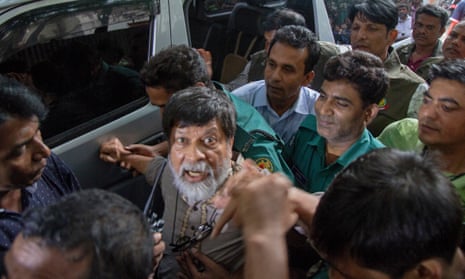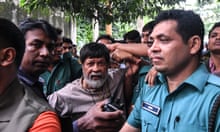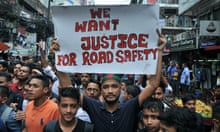Police in Bangladesh have charged a prize-winning photographer for “provocative comments” made in an al-Jazeera interview about protests that have convulsed the country for more than a week.
More than 100 people were injured at the weekend during a demonstration over road safety as police fired teargas and rubber bullets and crowds of people attacked protesters, photographers and the US ambassador’s car.
At least 20 plainclothes officers picked up Shahidul Alam, 63, at his home in the capital, Dhaka, at about 10pm on Sunday, hours after his comments were broadcast by the Qatar-based TV station, his colleague Abir Abdullah told Agence France-Presse.
Police charged Alam on Monday under section 57 of Bangladesh’s Information Communications Technology Act, a broad law against electronic communication that “tends to deprave or corrupt” or prejudices the image of the state. He was placed on seven-day remand.
Scores of journalists and citizens have been arrested without warrant, prosecuted and jailed under the law, which human rights groups say is draconian and the government admits has been misused.
Friends of the photographer said he was unable to walk by himself in court and told them he had been assaulted by authorities. “He said he was beaten up and had blood all over,” said ASM Rezaur Rahman, a colleague.
Alam is the founder and managing director of the Drik gallery and the creator of the Pathshala South Asian Media Institute in Dhaka, which has trained hundreds of photographers.

His photographs have been published in almost every major western media outlet, including the New York Times, Time magazine and National Geographic in a career that has spanned more than four decades.
In recent days, Alam photographed the demonstrations by tens of thousands of teenagers in Dhaka and beyond, and discussed the protests on Facebook Live.
His partner, Rahnuma Ahmed, told a press conference in Dhaka she was near their apartment on Sunday night when the photographer was taken.
“I was not in the flat, but I heard a scream and I ran down to find out [what had happened],” she said. “We heard from the security guards and our landlord that [Alam] had been forced into a car. There have been about 30 to 35 men in plain dress. They had forcefully taken away the CCTV camera footage, they put Scotch Tape on the CCTV camera.”
The student protests, now in their ninth day, began after a speeding bus killed two teenagers on 29 July, with demonstrators calling for government to address Bangladesh’s chaotic roads.
On Saturday, the Dhaka protests turned violent when more than 100 people were hurt as police fired rubber bullets at demonstrators, according to students and doctors who treated the injured.
There was more violence raged on Sunday as police fired teargas into a large crowd marching toward an office of the ruling Awami League party.
Amnesty International called for Alam to be “immediately and unconditionally released”.
Omar Waraich, the group’s deputy South Asia director, said: “His arrest marks a dangerous escalation of a crackdown by the government that has seen the police and vigilantes unleash violence against student protestors.
“The Bangladeshi government must end the crackdown on the student protestors and people speaking out against it. The students have a right to peaceful assembly and physical security.”
The UN said it was “deeply concerned about the reports of violence” and that worries about road safety were legitimate.
Police have also detained an actor for spreading rumours after she allegedly said in a Facebook post that two protesters had been killed and another had had an eye gouged out.
Agence France-Presse contributed to this report



